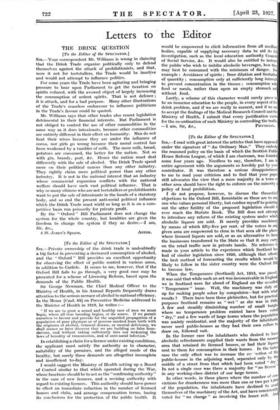[To the Editor of the SPECTATOR.] SIR,—Private ownership of the
drink trade is undoubtedly a big factor in preventing a decreased consumption of alcohol, and the " Oxford " Bill provides an excellent opportunity for observing the effect of public control in various areas, in addition to Carlisle. It seems to me, however, that if the Oxford Bill fails to go through, a very good case may be presented for a scheme of Licensing Reform, based upon the demands of the Public Health.
Sir George Newman, the Chief Medical Officer to the Ministry of Health, in his Annual Reports frequently draws attention to the serious menace of alcohol to national efficiency. In the Memo [Cmd. 63] on Preventive Medicine addressed to the Minister of Health in 1919, he writes :-
" If we aro to grow a sound and healthy race of men we must begin, where all true breeding begins, at the source. If we permit ourselves to favour and provide for the unguided propagation of a population of poor physique or of persons marked from birth with the stigmata of alcohol, venereal disease, or mental deficiency, we shall sooner or later discover that we are building on false foun- dations, and without taking sufficiently into our reckoning the laws of heredity of transmission, and of ante-natal infection."
In establishing a claim for a licence under existing conditions, the applicant must satisfy the authority as to character, suitability of the premises, and the alleged needs of the locality, but surely these demands are altogether incomplete and insufficient to-day.
I would suggest the Ministry of Health setting up a Board of Control similar to that which operated during the War, whose functions should be to act as the "confirming authority" in the case of new licences, and a revising authority with regard to existing licences. This authority should have power to effect an immediate reduction in the number of licensed houses and clubs, and arrange compensation terms, basing its conclusions for the protection of the public health. It would be empowered to elicit information from all ancillary bodies, capable of supplying necessary data to aid its investigation, such as the local education authority Councils of Social Service, &c. It would also be entitled to instru the public who wish to imbibe alcoholic beverages, how they may best be consumed with the minimum of danger. For example : Avoidance of spirits ; freer dilution and limitation of quantity ; consumption only at sufficiently long intervals to prevent concentration in the tissues ; consumption with food or meals, rather than upon an empty stomach and without food.
Lastly, a scheme of this character would surely prove to be an immense education to the people, in every aspect of the drink problem, and if we are really in earnest, and if we are to accept the findings of the Medical Research Council and the Ministry of Health, I submit that every justification exists for the co-ordination of such Ministry in controlling the traffic,










































 Previous page
Previous page